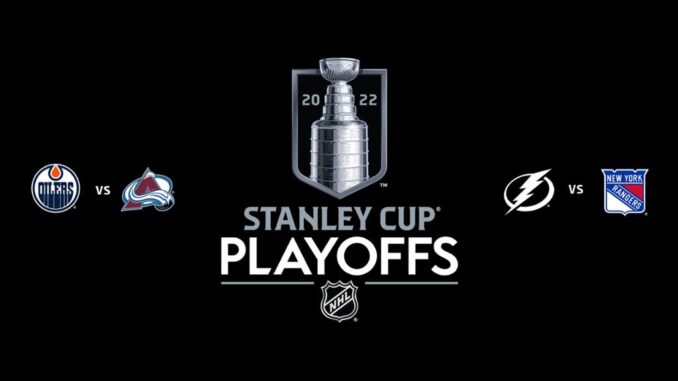
After two grueling rounds, the Eastern and Western Conference Finals are set to kick-off, with berths in the 2022 Stanley Cup Final on the line.
In the East, the reigning champions Tampa Bay Lightning look to get closer to becoming the first franchise to three-peat since the New York Islanders captured four consecutive titles from 1979 to 1983. The New York Rangers have triumphed in back-to-back game sevens and look to upset the NHL’s model franchise to reach their first Final since 2014 and win their first Cup since 1994.
In the West, the Colorado Avalanche overcame their second-round hurdle and will try to fulfill their championship potential and capitalize on years of strong management to get them to this point. Standing in their way is Connor McDavid, the Edmonton Oilers’ one-man army in attack. He’s produced a playoff campaign for the ages, and slaying the mighty Avalanche would only add to his growing lore.
Let’s dig into the matchups that will define each series and determine which pair of organizations will vie for the sport’s greatest prize.
Eastern Conference Final
New York Rangers vs. Tampa Bay Lightning
The major storyline of this series is the impending battle between arguably the two best goalies in the NHL in Igor Shesterkin of the Rangers and Andrei Vasilevskiy of the Lightning. According to MoneyPuck, they rank first and second in goals saved above expected (GSAx) in these playoffs and have stolen several games for their teams through the first two rounds. Both teams have many skilled offensive weapons, so this series could be determined by which netminder falters first.
The Rangers boast the postseason’s second-most prolific power play at 32.5% but will be going up against the Lightning’s third-ranked penalty kill (87.8%). Tampa Bay entered the playoffs with the 11th-best shorthanded unit, while the Rangers’ power play sat firmly within the top-five, suggesting the Lightning might be playing over their heads. Whichever team wins the special teams battle will wrest momentum for the entire series.
The Rangers’ offense will be driven through Mika Zibanejad (19 points in 14 games), defender Adam Fox (18 in 14), Chris Kreider (eight goals), or Artemi Panarin. The Russian winger has struggled to maintain his regular-season form with only 11 points thus far, but he possesses true game-breaking ability that can abruptly shift the momentum. Even with Pavel Buchnevich and rising stars in Alexis Lafreniere and Kaapo Kakko making up the rest of the forward core, New York is a weak 5-on-5 team. Adding Andrew Copp at the deadline shored up that issue slightly, but they still live and die by Shesterkin and their power play.
Despite missing star center Brayden Point for the entirety of their second-round series against the Florida Panthers, the Lightning swept their state rivals with ease. They kept the NHL’s highest-scoring regular season team to three goals in four games, looking more like the group that has captured the last two Stanley Cups. Much of it is due to Vasilevskiy’s brilliance, but the core made up of Nikita Kucherov, Steven Stamkos, and Victor Hedman has yet to show signs of wear and tear. Kucherov ranks sixth in playoff scoring (15 points), while Hedman currently sits third (10) among defensemen.
While the stars almost faltered against the Toronto Maple Leafs in Round One, the Lightning’s depth has taken on a greater role in driving the offense. Ross Colton is third on the team in scoring with 8 points in 11 games, Corey Perry continues to contribute on the scoresheet with five goals, and Nick Paul tallied two goals in their game seven triumph over the Maple Leafs. A Stanley Cup run can often be a slog, and your supporting cast must be capable of stepping up as required to breakthrough in the tight moments.
The Lightning have dispatched two of the league’s best teams this season in the Panthers (first in the NHL) and Maple Leafs (fourth), on their way to a third-consecutive trip to the Eastern Conference Final. What those two clubs lacked was a goalie the caliber of Shesterkin. His presence is the great equalizer, and Point’s continued absence leaves the Lightning without one of their top forwards. The Rangers have the tools to steal the series, but I think that the Lightning are peaking at the right time, not to mention they have a superhuman netminder of their own.
The Verdict: Lightning win the series 4-2
Western Conference Final
Edmonton Oilers vs. Colorado Avalanche
The Oilers boast an unstoppable first line and represent Colorado’s greatest test to date. Among players to have featured in at least 12 playoff games in a single campaign, Connor McDavid and Leon Draisaitl are scoring at the fifth-highest rate in NHL history (2.17). Only Wayne Gretzky and Mario Lemieux have eclipsed the current pace of the Oilers’ superstar duo, and the pair are unmatched in the salary cap era.
One criticism of the Oilers’ roster building has been their lack of depth behind their offensive juggernauts. In adding Zach Hyman and Evander Kane throughout the season, Edmonton has significantly bolstered their scoring options down the lineup. Kane has tallied 12 goals through the first two rounds and could smash Reggie Leach’s record of 19 markers in a single postseason, a benchmark set in the 1976 Playoffs.
After several years of inconsistent play, Oilers’ goalie Mike Smith has turned in a postseason to remember. The 40-year-old netminder owns a .927 save percentage (SV%) heading into the Western Conference Final, even while he’s produced some of his trademark bloopers occasionally. Goaltending is voodoo, and it’s unwise to depend on someone at the tail-end of their career to keep submitting uncharacteristically strong performances, but the playoffs throw out all preconceived notions of logic.
As is the case with most teams in the salary cap era, it’s impossible to construct a roster without any flaws. For an otherwise faultless Avalanche side, their subpar penalty kill represents a worrying vulnerability for the Oilers to exploit.
Colorado’s penalty kill ranks 11th in these playoffs, erasing just over 73% of their opponents’ powerplay opportunities. Despite dominating the run of play at 5-on-5, they struggled to handle the St. Louis Blues while shorthanded, only going 9 for 13 in the second-round series. Their shakiness allowed the Blues to stave off elimination and crawl back from the brink. It’s unlikely that the Oilers’ globetrotter-like top power play unit will be as forgiving, however.
In terms of overall conversion and their per-60-minute rates of creating scoring chances and goalscoring, the Oilers ranked within the top-three leaguewide during the regular season. Over the past three seasons, McDavid (124 points) and Draisaitl (117) sit first and second in scoring with the man-advantage, and will look to generate momentum against a strong even-strength club.
Fortunately for the Avalanche, they can trot out a number of the league’s elite in both defense and attack. Nathan MacKinnon, Mikko Rantanen, and Gabriel Landeskog have often combined to form one of the NHL’s most feared forward triumvirates, and all three elevate their games come the playoffs. MacKinnon (third), Rantanen (fourth), and Landeskog (19th) rank within the top-20 in playoff points-per-game since the 2013-14 season, the first postseason experience for the team’s superstar center. Head coach Jared Bednar has split them up at times to spread the wealth, but their supercharged line is a wildcard capable of shifting momentum at will.
The Avalanche’s forward depth is key to overwhelming their opposition. Two-way studs such as Nazem Kadri, Valeri Nichushkin, and Artturi Lehkonen drive possession to an astounding degree, keeping the play away from their own net and generating ample offensive zone time.
On the blue line, Colorado can count on Cale Makar and Devon Toews, second and eighth in playoff points among defensemen since the 2018-19 season. The pair forms a dynamic duo capable of initiating breakouts at speed while fulfilling their defensive duties. They will be vital in stopping (or slowing down) McDavid and company, and should handle most of the transition workload from the backend. With Samuel Girard’s untimely injury, 20-year-old Bowen Byram has filled in admirably in his stead. If he continues his rapid development, the Avalanche suddenly own a three-headed hydra in defense.
After a regular season in which he sat on the fringes of the Vezina Trophy discussion, Darcy Kuemper’s play has faltered over the first two rounds of the playoffs. He has only posted a .904 SV% and prevented minus-3.86 GSAx, nearly costing the Avalanche their first third-round appearance in two decades against the St. Louis Blues. The Oilers won’t dominate the shot or chance battle against the Avalanche, so the 32-year-old netminder has to be prepared to step up while being relatively untested.
On balance, the Avalanche can match the Oilers’ star power and possess greater depth across the rest of their lineup. A best-of-seven series is an extremely small sample of games, and all it takes is for a player or two to have a hot streak for the tide to turn. I’m betting on the team that nearly captured the Presidents’ Trophy despite missing its key players at several points this season.
The Verdict: Avalanche win the series 4-2
2022 Conn Smythe Trophy Watch
- Connor McDavid, Edmonton Oilers (12GP; 7G-19A-26PTS)
- Igor Shesterkin, New York Rangers (14GP; .928 SV%; +11.4 GSAx)
- Leon Draisaitl, Edmonton Oilers (12GP; 7G-19A-26PTS)
- Andrei Vasilevskiy, Tampa Bay Lightning (11GP; .932 SV%; +11.0 GSAx)
- Nathan MacKinnon, Colorado Avalanche (10GP; 8G-5A-13PTS)
Data courtesy of Evolving Hockey, MoneyPuck and the NHL.




